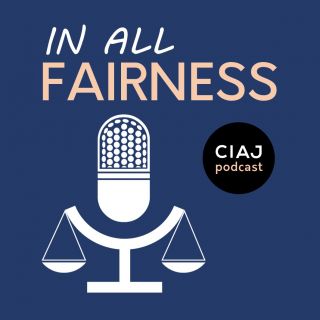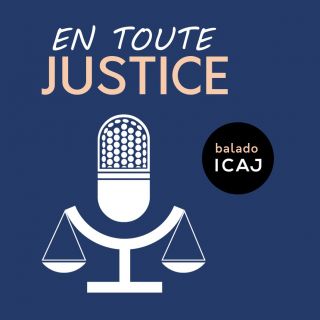Découvrez les épisodes
Episode 71 (En anglais): Life After Wrongful Conviction: Maria Shepherd's Story
02 Oct 2023
In this episode with her friend and UBC Innocence Project Director Tamara Levy, Maria Shepherd explains the myriad of experiences and tragic consequences that resulted from her wrongful conviction, and how it still affects her life.
Episode 70 (En anglais): The Toxic Drug Crisis Podcast Series: Is Harm Reduction Enough?
21 Sep 2023
Three interrelated topics related to the toxic drug crisis will be addressed over the course of three episodes. This first episode focuses on harm reduction and the impact of stigma on people who use drugs. Host: Sarah Rowe Guests: Dr. Geoff Bardwell and Craig Marshall.
Episode 69 (En anglais): Transgender and Non-Binary Asylum Seekers in Canada
07 Sep 2023
In 1991, Canada was “the first country to accept refugee petitions based on persecution due to sexual orientation or gender identity.” Over the years, recognition of 2SLGBTQIA+ vulnerability has caused the number of sexual orientation and gender identity refugee claims to increase in the country. Does Canada’s identity as a safe haven allow for an easy entry system for these claimants? In this podcast, host Sarah Rowe addresses this question and more with guests Kelly Ernst and Jay De Santi.
Episode 68 (En anglais): People-Centred Approach to Justice
29 Août 2023
In this episode, host Daniel Escott is joined by Janet McIntyre, former Director of Justice Canada's Access to Justice Secretariat, for a discussion on the United Nations' Sustainable Development Goal 16, the role of the secretariat domestically and internationally, and the gradual shift to a people-centred approach to justice.
Episode 67 (En anglais): Defining Access to Justice
24 Août 2023
In this episode, host Daniel Escott is joined by Trevor C.W. Farrow, a renowned access to justice researcher and incoming Dean of Osgoode Hall Law School, for a discussion on the pre-, during, and post-pandemic views of traditional access to justice. Dean Farrow provides a wealth of information on the problems that arise from a lack of access to justice, and discusses what meaningful access to justice looks like in the modern, post-pandemic period.
Episode 66 (En anglais): Access to Justice Collaboration Across Canada
17 Août 2023
In this episode, host Daniel J. Escott explores the transformative landscape of access to justice in Canada in the company of his guests, esteemed legal experts Mark Benton, K.C. and Brea Lowenberger. Together, they discuss the impact of the Action Committee on Access to Justice in Civil and Family Matters at both national and local levels and explore how collaborative efforts between stakeholders can help improve access to justice across Canada.
Episode 65 (En anglais): Rooted Constitutionalism
15 Juin 2023
In this episode, CIAJ Lawyer Nathan Afilalo is welcoming Aaron Mills, a member of the Anishinaabe, Couchiching First Nation and Assistant Professor and the Canada Research Chair in Indigenous Constitutionalism and Philosophy at McGill University Faculty of Law. Together, they discuss, among other things, professor Mills' theory of rooted constitutionalism.
Épisode 64: Face aux nouveaux enjeux de la mondialisation économique, les frontières nationales ont-elles encore un sens?
Droit international – 16 Fév 2023
Dans un contexte de mondialisation, les frontières nationales ont-elles encore un sens? Pour répondre à cette question, l’ICAJ reçoit Richard Ouellet, professeur de droit international économique à la Faculté de droit de l’Université Laval et titulaire de la nouvelle Chaire de recherche sur les nouveaux enjeux de la mondialisation économique.
Episode 63 (En anglais): Trust and Dignity: What Do Citizens Want and Need in a Modern Justice System?
02 Fév 2023
In this excerpt from CIAJ's 2022 Conference on dignity, CIAJ Lawyer Nathan Afilalo welcomes Rheanne Scott (Director, Justice and Community Safety, PwC Canada) for a special interactive session including testimonials.
Episode 62 (En anglais): Accessibility and Accommodations in Law Schools
01 Déc 2022
In this episode, Lan Keenan, President of the Schulich Disability Alliance and JD candidate at Schulich School of Law at Dalhousie University, provides an overview of accessibility and accommodation issues and solutions in law schools.
Episode 61 (En anglais): The Concept of Dignity in Canadian Case Law: Ethical and Practical Aspects
20 Oct 2022
In this episode, Professor Cheryl Milne and CIAJ Legal Researcher Nathan Afilalo discuss the practical aspects of the use of the concept of dignity in Canadian case law, and the ethical and practical implications of practising law consistent with the concept of dignity.
Épisode 60 : Dignité et aide médicale à mourir
Dignité – 13 Oct 2022
Dans cet épisode, l'avocat et éthicien Me Pierre Deschamps, C.M, Ad. E, livre un point de vue expert sur la dignité et l'aide médicale à mourir.
Episode 59 (En anglais): Expunging Cannabis Convictions
06 Oct 2022
In this episode, Adjunct Research Professor Dr. Samantha McAleese from Carleton University and Lawyer Russell Bennett, founder of Cannabis Law, Barristers & Solicitors, tackle the topic of expunging cannabis convictions.
Épisode 58 : L'autonomie gouvernementale des peuples autochtones
Peuples autochtones – 18 Août 2022
Cet épisode est un extrait de la 45e Conférence annuelle de l’ICAJ intitulée « Les peuples autochtones et le droit ». Dans cet extrait, vous entendrez la présentation de Nadir André, un avocat spécialisé en droit autochtone et associé chez BLG.
Episode 57 (En anglais): Debra Sparrow’s Land Acknowledgement Address From CIAJ’s 45th Annual Conference on Indigenous Peoples and the Law
04 Août 2022
This is an excerpt from CIAJ's 45th Annual Conference on Indigenous Peoples and the Law. CIAJ is pleased to widely share the Land Acknowledgement address made by Debra Sparrow, on November 17, 2021.
Épisode 56 : Les Principes de Gladue et la santé mentale
Peuples autochtones – 21 Juil 2022
Cet épisode est un extrait de la 45e Conférence annuelle de l’ICAJ sur les peuples autochtones et le droit, qui a eu lieu en novembre 2021. Il s’agit d’une partie du panel numéro 6, qui porte sur la question du traitement des délinquants autochtones au Canada. Dans cet extrait, vous entendrez la présentation de la juge Michelle O’Bonsawin.
Episode 55 (En anglais): The Honourable Robert J. Bauman’s Address From CIAJ’s 45th Annual Conference on Indigenous Peoples and the Law
07 Juil 2022
CIAJ is pleased to widely share the address made by the 2021 Conference Chair, The Honourable Chief Justice of British Columbia Robert J. Bauman, on November 17, 2021.
Episode 54 (En anglais): Self-Induced Intoxication: An Update on Bill C-28
23 Juin 2022
In this episode, CIAJ’s Executive Director Christine O’Doherty is welcoming Professor Kent Roach to provide an update on Bill C-28 on extreme intoxication.
Episode 53 (En anglais): The Honourable Murray Sinclair’s Address From CIAJ’s 45th Annual Conference on Indigenous Peoples and the Law
21 Juin 2022
CIAJ is pleased to widely share the address made by the 2021 Conference Honorary Chair, The Honourable Murray Sinclair, on November 17, 2021.
Épisode 52 (En anglais): The SCC and the Matter of R. v. Brown and Self-Induced Intoxication
16 Juin 2022
In this timely episode, Sarah A. Inness and Professor Kent Roach will discuss the history of the defence of self-induced intoxication, how it was interpreted and applied in previous cases, its inclusion as Section 33.1 of the Criminal Code, and the potential fallout of the Brown decision for Parliament.


